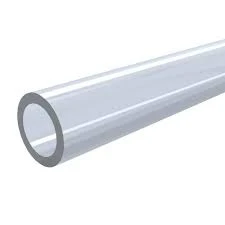Aug . 13, 2024 05:16 Back to list
Exploring the Versatility and Applications of PVC Tubing in Various Industries and Crafts
Understanding PVC Tubing Versatility and Applications
Polyvinyl chloride (PVC) tubing, often simply referred to as PVC tube, has become a staple in various industries due to its exceptional versatility, durability, and cost-effectiveness. This synthetic plastic polymer is widely recognized for its ability to be molded into different forms, making it ideal for a broad range of applications. In this article, we will explore the key characteristics of PVC tubing, its various uses, and why it has gained popularity over other materials.
Characteristics of PVC Tubing
One of the primary attributes of PVC tubing is its lightweight nature. This feature makes it easy to transport, handle, and install, which is particularly beneficial in construction and plumbing applications. Additionally, PVC is resistant to corrosion and chemicals, which means that it is less likely to deteriorate over time compared to metal piping. Its resistance to moisture and UV radiation further enhances its durability, making PVC an excellent choice for both indoor and outdoor applications.
Another key characteristic of PVC tubing is its flexibility. This quality allows it to be used in various configurations without the risk of breaking or cracking. PVC can also be produced in different thicknesses and diameters, allowing manufacturers and consumers to select the specific type that meets their needs. Moreover, PVC can be easily joined using solvents or adhesives, which simplifies the installation process.
Common Applications of PVC Tubing
pvc tube

Due to its unique properties, PVC tubing finds application in a plethora of fields. One of the most common uses is in plumbing and drainage systems. PVC pipes can handle high pressures and are commonly used for water supply lines, sewer lines, and drainage systems. Their chemical resistance makes them ideal for transporting wastewater and other liquids without the risk of leakage or contamination.
In addition to plumbing, PVC tubing is also widely used in the irrigation industry. Farmers and agricultural specialists utilize PVC pipes for efficient water distribution systems in fields and greenhouses. The lightweight and corrosion-resistant nature of PVC ensures that these systems are both effective and sustainable.
PVC tubing is also prominent in the medical industry. Medical-grade PVC tubing is used for a variety of applications, including blood transfusions, intravenous (IV) therapy, and in various medical devices. Its biocompatibility, alongside its ability to be sterilized, makes PVC a reliable choice for such critical applications.
Furthermore, the construction industry heavily relies on PVC tubing for electrical wiring. PVC conduits provide protection for electrical wires from moisture and physical damage, ensuring safe and reliable electrical installations. The flexibility of PVC also allows for easy bending and shaping, which can accommodate various architectural designs.
Conclusion
In summary, PVC tubing is an indispensable material across numerous industries due to its versatility, durability, and cost-effectiveness. Its wide-ranging applications—from plumbing and irrigation to medical and electrical uses—underscore its importance in modern society. As industries continue to evolve, PVC tubing is likely to remain a popular choice due to its adaptable nature and ability to meet various needs efficiently. With ongoing advancements in manufacturing and technology, the future looks bright for PVC products, promising even more innovative applications in years to come.
-
HDPE Pipe Fittings: Durable, Leak-Proof Solutions
NewsAug.16,2025
-
Premium CPVC Sheet: High-Temp & Chemical Resistant Solutions
NewsAug.15,2025
-
Durable PPR Pipe for Hot & Cold Water Systems - Easy Install
NewsAug.14,2025
-
Durable HDPE Sheet | Versatile & Impact-Resistant Plastic
NewsAug.13,2025
-
Premium PVC Soft Sheets: Clear, Flexible & Durable
NewsAug.12,2025
-
Premium PVC Round Rods: Durable, Chemical Resistant, Easy to Machine
NewsAug.11,2025

